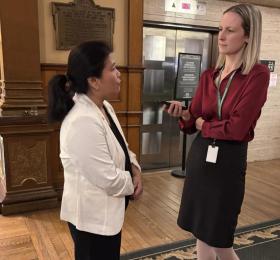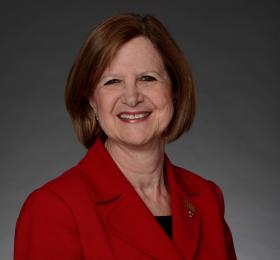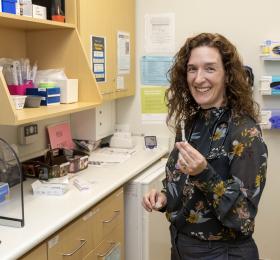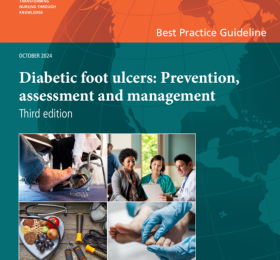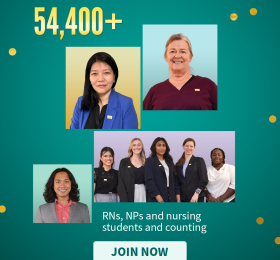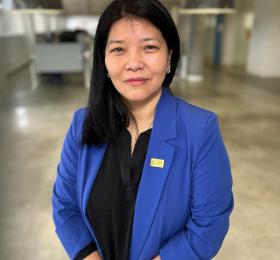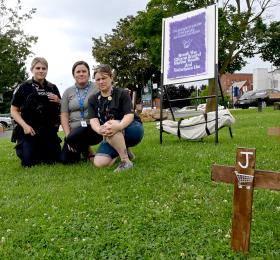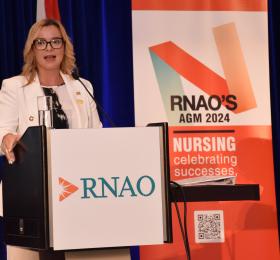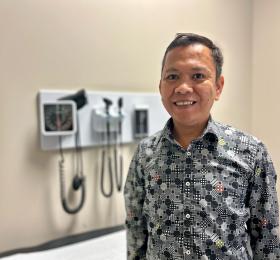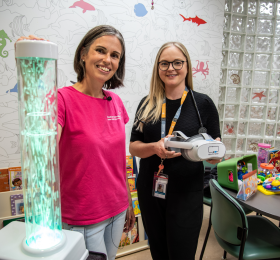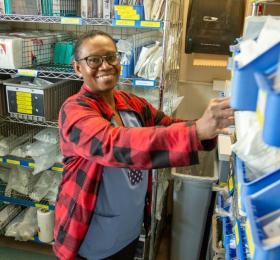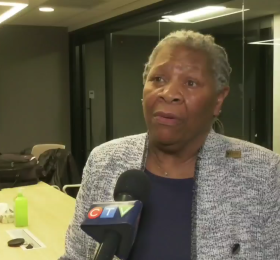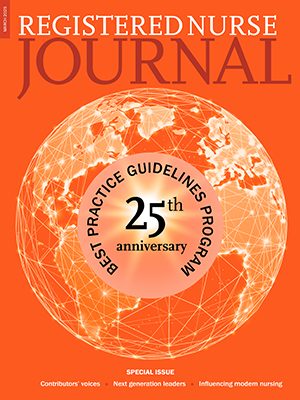Nurses must engage during election process
The next provincial election will take place on Feb. 27 and RNAO is calling on all political parties to share their plans to improve the health and wellbeing of nurses and their patients, clients and communities. “Health care is complex and investment in health care can always go a long way,” RNAO President NP Lhamo Dolkar told CP24 in a live interview (Jan. 29). Recent investments in primary care are welcome, she said, noting the number of Ontarians who do not have access. “It’s important we invest in primary care solutions, which is an upstream strategy. There are currently 2.5 million Ontarians who do not have primary care,” she said. Dolkar also highlighted our publicly funded, not-for-profit health-care system. “It’s important that we continue to focus on the values that align with the universal health-care system, where we’re not focused on investor driven health care.” Learn more about RNAO’s call for every nurse to actively engage in the democratic process by asking critical questions and challenging political candidates on the campaign trail. Visit the 2025 provincial election platform.
NPs as clinical directors in long-term care
In December 2024, the Ontario government announced legislation that would introduce the NP clinical director role in long-term care. Clinical directors oversee and evaluate residents’ overall care and help identify and address health-care issues related to quality of life. In a media release, RNAO President NP Lhamo Dolkar said: “RNAO is thrilled the government heard our call to expand the scope of NP utilization…to help alleviate pressures on the sector amid the ongoing physician shortage, and to help retain and recruit staff.” This new role is “a win for residents and families that will see the benefit of clinical directors in all 670 homes, a win for health professionals who will feel more supported; and a win for nurses who will see more opportunities to build their careers in Ontario.” (The Canadian Press, Dec. 11)
Federal government urges Ontario to create publicly funded model for NPs
On Jan. 10, the Federal Minister of Health Mark Holland issued a letter to provincial and territorial ministers of health to confirm a Canada Health Act policy requiring them to create a public funding model for NPs and other regulated health professionals by April 1, 2026. Charging patients for medically necessary services will be prohibited under this new policy, requiring Ontario to comply or face penalties. RNAO has long called for a publicly funded model without user fees for independent NPs in primary care. “Many nurse practitioners currently provide care through fee-for-service clinics across Ontario due to a lack of funding for their services,” said RNAO CEO Dr. Doris Grinspun. “Closure of these clinics would exacerbate the crisis if Ontario does not act swiftly to support an innovative public funding model.” RNAO remains focused on improving primary care for all Ontarians – without user fees – and is eager to work with the provincial government and Dr. Jane Philpott, former federal health minister and recently appointed chair of Ontario’s primary care action team, to develop such a model for NPs. (Ottawa Citizen, Jan. 10)
New baccalaureate program a first in 20 years
Ontario Premier Doug Ford announced a new Bachelor of Science in Nursing Program at Ottawa’s Carleton University on Nov. 5, 2024. It has been two decades since a new university-based nursing program has been created in Ontario. This program is also the first in the world to integrate RN prescribing into its curriculum, heeding the call from RNAO since 2012. In a media release, RNAO President NP Lhamo Dolkar said: “Expanding the number of nursing seats in the province helps address demand across all health sectors and is key to alleviating the nursing shortage.” RNAO CEO Dr. Doris Grinspun said: “It is imperative to integrate RN prescribing into all BScN programs. We’re delighted that the university and the government see the opportunity that we do. This first-in-the-world expanded program opens the door to enhance the RN role, making the profession more attractive and most importantly, removing a barrier to care at a time we need to do everything we can to deliver faster access for Ontarians.”
Students learn more about RNAO during placement
Undergraduate nursing students were given the unique opportunity Nov. 13 to 16, 2024, to see the work of RNAO firsthand as participants in the association’s student placement. They attended an orientation session at home office and heard presentations from department representatives about their work on behalf of members. The students who participated were from McMaster University, Mohawk College, Nipissing University, Ontario Tech University, Seneca College, St. Lawrence College, Toronto Metropolitan University, Western University and York University. Key to the placement is attending the board of directors and the assembly of leaders’ meetings. Student placements are offered three times each year. Visit RNAO's membership website to learn more and keep abreast of registration deadlines for the next placement.
NPs say RSV vaccine clinic for infants will ease pressure
The Children’s Hospital at London Health Sciences Centre is offering the Respiratory Syncytial Virus (RSV) vaccine to infants who do not have a family doctor. NP and RNAO member Erin Fleischer, who works in the clinic, says RSV can make children extremely sick. “The vast majority of kids who are admitted to hospital with RSV are otherwise healthy, term babies,” she suggests. “They have no other underlying medical conditions that would make them at risk.” In fact, “The healthy population can be just as affected as our high-risk population,” Fleischer adds. The hospital hopes that boosting uptake of the RSV vaccine will help take pressure off emergency departments, urgent care, doctor’s offices and walk-in clinics. (London Free Press, Nov. 4)
New guidelines released on pressure injuries and diabetic foot ulcers
The newest editions of two best practice guidelines (BPG) were released in the Fall of 2024. Diabetic Foot Ulcers: Prevention, Assessment, and Management (third edition) was published on Oct. 17. Pressure injury management: Risk assessment, prevention and treatment (fourth edition) was released on Nov. 21, 2024.
The BPGs are among the more than 50 published by RNAO, and provide nurses, members of the interprofessional team, and other collaborators around the world with up-to-date evidence-based recommendations to support care in these two areas.
The pressure injury BPG’s 16-member expert panel was led by Dr. Dimitri Beeckman, professor of nursing science at Ghent University (Belgium) and Örebro University (Sweden), and Corey Heerschap, wound and ostomy clinical nurse specialist at Barrie’s Royal Victoria Regional Health Centre (Canada).
“Through the integration of current research findings, new technologies and relevant clinical strategies, this guideline provides a resource for health-care providers to deliver high quality care, leading to the reduction of incidence and severity of pressure injuries,” says Heerschap.
The diabetic foot ulcer BPG’s interprofessional expert panel was co-chaired by Dr. Mariam Botros, CEO of Wounds Canada, and Dr. Kevin Woo, professor at the Faculty of Health Sciences, School of Nursing for Queen’s University.
“Diabetic foot ulcers are a serious complication that can lead to amputations, but four out of five amputations are preventable with the right care,” says Botros. “These guidelines have a tangible impact in our practice, allowing us to improve the wellbeing and quality of life for individuals, ease the financial burden on our health system and support equitable care."
The BPGs are available online for free download.
Another successful membership year
RNAO closed out its 2023/24 membership year on Oct. 31, 2024, with an impressive 54,400+ members strong. The current 2024/25 membership year marks the association's 100th anniversary. Members are integral to celebrating this milestone and continuing the legacy of action and impact that has drawn so many to join throughout the association’s history. We encourage all RNs, NPs and nursing students to be members of RNAO.
RNAO marks Remembrance Day 2024
RNAO members traditionally lay wreaths each year at cenotaphs and city halls across the province to honour soldiers and the nurses who took care of the wounded during various wars and conflicts.
On Nov. 11, 2024, Region 4 board member Poonam Sharma (left) laid a wreath on behalf of Ontario nurses at the Town of Caledon's Remembrance Day ceremony. RNAO President NP Lhamo Dolkar also represented the association and its members at a Remembrance Day ceremony in the Memorial Gardens at Toronto's East York Civic Centre.
Government’s plan to gut and prohibit harm reduction programs will lead to more deaths
Following an announcement from Ontario’s Minister of Health that the province will close 10 supervised consumption services (SCS) sites across the province, RNAO CEO Dr. Doris Grinspun told CBC News’ Power & Politics (Aug. 20) that more people will die and communities will be overburdened. “The government knows very well that not everybody is ready for treatment,” Grinspun said. And while RNAO welcomes the newly announced Homelessness and Addiction Recovery (HART) Hubs, as these will provide mental health and social services, “…we were expecting also an expansion of SCS and CTS (consumption treatment services).” The closure of these 10 SCS sites means persons will be using substances alone in alleyways, and that’s a death sentence for them, given the high level of toxic drugs circulating, Grinspun said. Drug toxicity killed 3,800 people in 2023, and that number will go up in 2024, she warned. In addition to more deaths, the decision to exclude SCS and needle exchange from the new HART hubs will lead to a rise in HIV and hepatitis C infections, as people will be injecting with used needles, which will be left in our streets, parks, coffee shops and parking lots, thus also making communities more unsafe. The failed policy will place a burden on paramedics and emergency departments. “It will cost a fortune in taxpayers dollars,” Grinspun said, noting the already overburdened health system will soon deal with a higher influx of people in crisis. “My heart sunk (at the news),” said RN Hannah Stahl, who works at an SCS site and co-leads Toronto’s Street Nurses Network. “When people fall through the cracks of the system, this (SCS) is what caught them,” she told the Toronto Star (Aug. 20).
Sign RNAO’s Action Alert calling on Premier Doug Ford to withdraw his plan to gut and prohibit SCS sites in Ontario. And read more in Grinspun’s Conversations with Members in this issue.
RNAO celebrates Pride
RNAO and members of the Rainbow Nursing Interest Group (RNIG) marched in Toronto’s Pride Parade alongside tens of thousands of other attendees to celebrate 2SLGBTQI+ communities (Two-Spirit, lesbian, gay, bisexual, trans, queer, intersex, and other sexual and gender minorities). “Thank you to everyone who participated in Pride festivities and who continue to advocate for equity, diversity and inclusion in health care and beyond,” said RNAO CEO Dr. Doris Grinspun, who took part with NP President Lhamo Dolkar on June 30. Pride month may have ended, but RNAO remains committed to working with members of 2SLGBTQI+ communities to improve health access and advance safe, appropriate care for all. Visit RNAO's Pride 2024 Portal, the 2SLGBTQI+ In Focus page on the website, and download your free copy of the best practice guideline: Promoting 2SLGBTQI+ Health Equity.
Earlier this year, RNIG asked its members to share personal stories to raise awareness of the challenges they face in their practice and providing care. Read Queer nursing: Stories of thriving 2SLGBTQI+ care providers. These are the first in a series of stories that will be published in RNJ and the RNIG newsletter.
New data shows Ontario’s nursing shortage is getting worse
A report by the Canadian Institute for Health Information (CIHI) reveals worsening nursing workforce trends in Ontario. The province now needs 26,000 additional RNs to catch up to the RN-to-population ratio in the rest of Canada. The gap between Ontario’s ratio and that of other provinces and territories has widened three per cent since 2022. “We need more RNs across all sectors working full-time at full scope, providing direct care to Ontarians,” RNAO President NP Lhamo Dolkar said in RNAO’s media release response to the troubling news (July 25). In a follow-up interview with 570 News (July 29, starting at 1:12 in the program), Dolkar reiterated what RNAO has said for years. “This is the ninth consecutive year that Ontario has had the worst RN-to-population ratio.” Dolkar also said the nursing shortage “has been an ongoing issue. We have to focus more on harmonizing the wage upwards across all sectors.” Compensation is important, she said, but not the only issue. She also addressed the need for safer working environments, healthy work-life balance, full-time opportunities and mentorship as vital to retaining and recruiting more nurses.
More support, less stigma saves lives
A community forum held in Brockville on July 25 brought together organizations working to support people struggling with mental illness, substance use and issues such as homelessness. The forum, which included a number of booths, was organized by Rideau Community Health Services, in partnership with the Brockville Police Service. A handful of crosses were planted in the grass to honour the lives of local residents lost to mental illness or substance use. RN Andrea Keller’s son Tyler died from overdose in March 2017. He was 26. “There are services around, but if you talk to (people representing them at the forum), every single one of them, they’ll tell you we need more,” Keller said. Amber Gilmour, a community health RN who works at Rideau, said they didn’t have enough crosses to mark all of the lives lost. “There’s a lot of shame and stigma,” she said. “People don’t always get the chance to be remembered.” (Brockville Recorder & Times, July 26)
Clinic sees drop in overdose thanks to safer-supply program
The Peterborough 360 Degree Nurse Practitioner-Led Clinic has seen a major reduction in overdose deaths since introducing its safer-supply program in 2022. A June 2024 report published by the clinic revealed a 79 per cent decrease over the previous six months compared to the first six months of the program. Approximately 86 per cent of the 30 individuals surveyed reported using less or no fentanyl after 12 months in the program, with half of those reporting a reduction in use and the other half reporting abstinence. NP lead and clinic director Kelly Pensom said: “This program has highlighted the positive impacts on the health and wellbeing of people who use drugs when their care is embedded within a destigmatized primary care team dedicated to trauma informed harm reduction.” The Peterborough program is one of 25 pilot programs funded by Health Canada (Global News, June 13).
RNAO member is new minister of long-term care
RN and MPP Natalia Kusendova-Bashta became Ontario’s Minister of Long-Term Care after a cabinet shuffle announced on June 6. Kusendova-Bashta, a proud RNAO member, had previously served as the parliamentary assistant to her predecessor Stan Cho. At RNAO’s AGM, she reminisced about attending her first political event as a nursing student, and described how it inspired her to pursue a career in politics. “The very first time I went to Queen’s Park was with Dr. Doris Grinspun…as a student…I fell in love with it…I fell in love with the incredible advocacy work that nurses do,” she told colleagues at the AGM opening ceremony. Kusendova-Bashta said she believes health should be considered in every government policy. In her role, she wants to ensure seniors have the quality of care they deserve. “I realize all the challenges that lay ahead,” she said about fixing long-term care. “And I find comfort in the fact that I have incredible leaders and experts, many of you in this room (at the AGM) who will guide me, as you have in the past.” We need more nurses across the continuum of care, she said, including and especially in long-term care. More NPs in long-term care “is how we will build capacity,” she said. Read more about NPs in NPs improve access and equity of care across Ontario.
Sudbury program eases loneliness in older adults
An innovative program in Sudbury is connecting older adults with children through intergenerational storytelling. Public Health Sudbury and Districts partnered with The Older Adult Centre to host GrandPals, an idea developed in Canada, at the local public library. The aim is to tackle the issue of isolation. “It’s neat to find a program like this established in Ontario,” said public health RN Larysa Vares. “We had three GrandPals (older participants) and each week we had eight to 12 children attend. Each GrandPal was paired with three to four young people every week,” Vares explained. The goal is to keep the children with the same senior every week so they can form a bond over the span of the seven weeks. “At public health, we have a role to play in healthy aging for older adults. We look at ageism and social isolation particularly. Those are two big societal issues,” Vares said. (Sudbury Star, May 15)
Supporting international RNs to practice
A Brampton hospital is making strides to integrate more internationally educated nurses (IEN) into its workforce. William Osler Health System launched a Supervised Practice Experience Partnership (SPEP) program two years ago to help IENs who are going through the nursing registration process and need to satisfy two of the requirements: evidence of practice and language proficiency. RN Manpreet Gill took part in this program and says it helped her get licensed and land a “dream job.” She described the experience to the Brampton Guardian (May 12) as “…very different than back in India. Here we are using different equipment. Osler gave me the opportunity to learn the hospital structure and how to work (as a nurse) in Canada.” Her experience is not indicative of every IEN’s experience in Ontario. RN Emil Patricio, who currently practises in Guelph, had to travel to Alberta and pay $7000+ out of pocket to be licensed before moving back to Ontario. “People from the Philippines are known for health care…our education there as a nurse is very comprehensive,” he said, acknowledging that he was disappointed by the challenges he faced. Patricio spent a decade volunteering at local hospitals and working as a PSW while working towards his recertification. RNAO CEO Dr. Doris Grinspun acknowledged that although RNAO is not the regulatory body, she apologizes “…on behalf of the profession to every single internationally educated nurse who is going through hurdles that are absolutely preventable.” RNAO continues its support and advocacy for IENs, and created a discounted category of membership – IEN associate – for those who reside in Canada but are not yet registered to practise. (CTV News, June 5)
Vaccine clinic helps children face fears around needles
A pediatric vaccination clinic at Children’s Hospital, part of London Health Sciences Centre, is addressing the stress and anxiety children can often feel when getting needles. The clinic was initially launched as a pilot project during the pandemic (2021). It has since received provincial funding that allows it to become permanent. The clinic has helped more than 300 children and the hospital expects the number to double within the next year. “Our goal is to work with each child and their family to come up with a game plan that will allow that child to successfully receive their vaccine on their own terms,” NP Leah Ethier said. The clinic supports babies as young as six months and children and young adults with special needs up to 18 years of age. Its success rate (vaccinations administered without requiring a second visit) is 92 per cent. (London Free Press, June 18)
Niagara Health wound care team healing patients
Niagara Health’s Wound Care team is helping to provide care for patients who may be dealing with serious issues, such as sepsis. RN Abi Osisanwo is one of five nurses trained to identify wounds early and provide appropriate treatment. Some illnesses, such as necrotizing fasciitis, can result in scarring, loss of a limb, sepsis and death. The wound care team at Niagara Health works collaboratively with nurses, doctors and other health-care workers to help patients who may come to hospital with pressure injuries or bed sores. “The body is amazing,” Osisanwo said. It “…heals itself but our role is to help prevent complications, such as infection or inflammation that would delay healing.” Interested in learning more about wound care? Attend the self-directed Wound Care Champion Program, designed by Wounds Canada in collaboration with RNAO. (St. Catharines Standard, May 30)
Sudbury supervised consumption site in need of support
Sudbury’s only sanctioned supervised consumption site (SCS) – formally called Minoogawbi, La Place, The Spot and informally known as The Spot – was forced to close its doors at the end of March. The city terminated its funding of the site at the end of December 2023, suggesting the province step in. The site continued to stay open through March thanks to donations. RNAO President Dr. Claudette Holloway was in Sudbury in January, sharing with local media that the SCS affects more than just the clients it serves. “When you fund this kind of treatment centre, it’s going to have an impact and reduce pressures on hospitals and emergency rooms,” she said (CTV News, Jan. 26). In the same CTV News story, RN and Sudbury and District chapter executive member Neil Stephen added that SCSs “see a reduction in local crime rates.” SafePoint, an SCS in Windsor, also closed on Jan. 1 and is seeking funding. However, the government has frozen approvals on SCS applications while it reviews safety protocols around the sites. This freeze is having a direct impact on those who rely on these services. “People who use these toxic substances recognize that they could die. (With these sites) they have access to not only safe supply, people who will witness in case they collapse but also have access to people who accept them for who they are – who help them try to get other services and give them medical care,” said RN and harm reduction advocate Kathy Moreland (AM 800, April 2). Join the more than 1,200 people who have already signed RNAO’s Action Alert to call on the premier to lift the freeze on SCS approvals.
National pharmacare announcement
Federal minister of health Mark Holland introduced Bill C-64, An Act respecting pharmacare, in the House of Commons on Feb. 29, 2024. This initial stage of national pharmacare – which RNAO has long advocated – will include coverage for contraception and diabetes medications, once provinces sign on to the plan. This will ensure Canadians are able to get the medications they need without the worry of how to pay. In a media release, RNAO President Dr. Claudette Holloway said “this legislation is significant because it brings us one step closer to RNAO’s long-standing push for a universal program. When fully realized, it will advance equity and fairness in our health system.” RNAO CEO Dr. Doris Grinspun said that nurses support pharmacare, but the program must expand. “It goes without saying that nurses stand fully behind (the plan). We also stand fully behind...a single payer system. Our end goal...is that it be comprehensive," Grinspun said, adding that she wants Ontario to be the first province to sign an agreement with the federal government. (Benefits and Pensions Monitor, March 7)


